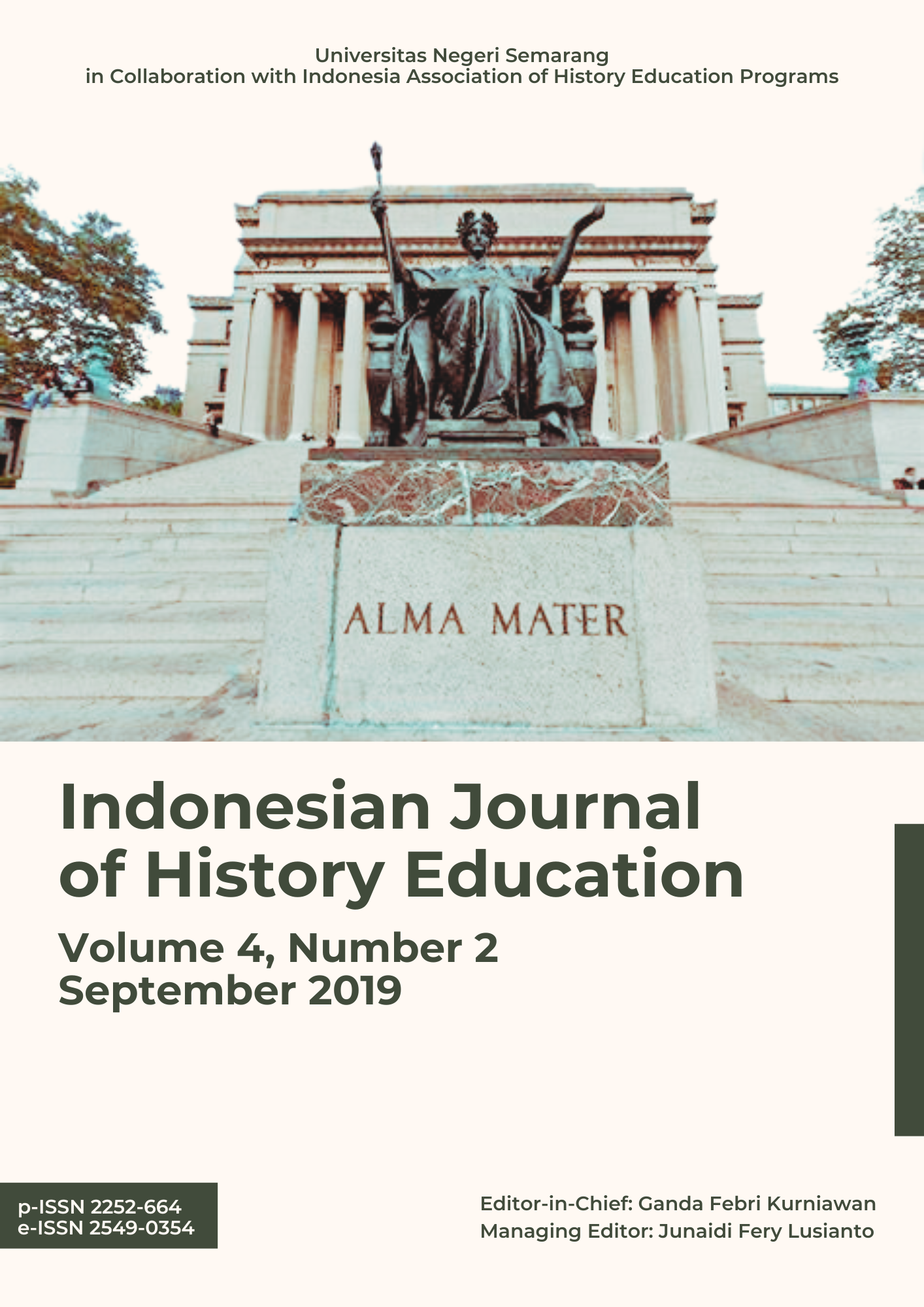Problem-Based Learning Model Experiment in History Learning History Learning Results for Class XI Students of SMAN 1 Pejagoan
Abstract
This study aims to (1) Know the learning outcomes of students given the learning model Problem-Based Learning, (2) Find out the learning outcomes of students treated with the various lecture methods, (3) Investigate whether there is a significant difference between the learning outcomes of the students given the learning model Problem-Based learning and the various lecture methods. The population of this study was all of the eleventh graders of SMA Negeri 1 Pejagoan. The sampling technique in this study is simple random sampling. This study uses a quantitative approach with experimental methods and a Quasi-experimental design. The study's results explained that the students' historical learning outcomes given the Problem-Based Learning model were better than those given the various lecture methods. The average value of the pre-test and post-test for the experimental group was 61.63 and 79.51. Meanwhile, the history learning outcomes of the students given the various lecture methods were also categorized as good, as the value of the pre-test and post-test increased from 59.5 to 77.64. There is also a significant difference between the experimental and the control group because the t-value was higher than the t-table (t-value > t-table = 2.87 > 1.997).
References
Agung S. Leo, Dan Wahyuni, S. (2013). Perencanaan Pembelajaran Sejarah. Ombak.
Alfian, M. (2011). Pendidikan Sejarah dan Permasalahan yang dihadapi. Khazanah Pendidikan, 3(2).
Aman. (2011). Model Evaluasi Pembelajaran Sejarah. Ombak.
Ayuni, F. N. (2015). Pemahaman guru terhadap pendekatan saintifik (scientific approach) dalam pembelajaran geografi. Jurnal Geografi Gea, 15(2).
Budiningsih, C. A. (2010). Pengaruh Strategi Pembelajaran Deep Dialogue Dan Kemampuan Awal Terhadap Pemahaman Materi Kuliah Teori Belajar Dan Pembelajaran. Jurnal Penelitian Ilmu Pendidikan, 3(2).
Hanafi, Y., & Aprilia, N. (2017). Pelatihan Pengembangan Manajemen Pembelajaran Untuk Menghadapai Masyarakat Ekonomi Asean (Mea) Melalui Lesson Studi Based Learning Community Di Smp/Mts Se-Kabupaten Bantul. Jurnal Pemberdayaan: Publikasi Hasil Pengabdian Kepada Masyarakat, 1(2), 393-400.
Hasan, H. S. (2007). ‘Kurikulum Pendidikan Sejarah Berbasis Kompetensi’. Makalah. Disampaikan Dalam Seminar Nasional Ikatan Himpunan Mahasiswa Sejarah Se-Indonesia (Ikahimsi). Universitas Negeri Semarang, Semarang, 16 April 2007
Husniyah, W., & Masrur, M. (2017). Manajemen Perpustakaan Sebagai Penunjang Hasil Belajar Siswa Di Ma Nurul Huda Pringsewu Kabupaten Pringsewu: Indonesia. Jurnal Manajemen Pendidikan Islam Al-Idarah, 2(1), 29-34.
Karyono, K. (2010). Pemanfaatan Museum sebagai Media Pembelajaran untuk Meningkatkan Pemahaman Siswa terhadap Materi Prasejarah Bagi Guruguru SMA Kota Semarang. Jurnal Abdimas, 14(1).
Lamato, S. A. (2016). Penanaman Kesadaran Sejarah dan Sikap Nasionalisme dalam Pembelajaran Sejarah Di SMA Negeri 2 Banggai. ISTORIA Jurnal Pendidikan dan Ilmu Sejarah, 12(2).
Made, W. (2009). Strategi Pembelajaran Inovatif Kontemporer. Bumi Aksara.
Morelent, Y. (2015). Pengaruh Penerapan Kurikulum 2013 Terhadap Pembentukan Karakter Siswa Sekolah Dasar Negeri 05 Percobaan Pintu Kabun Bukittinggi. Jurnal Gramatika: Jurnal Penelitian Pendidikan Bahasa Dan Sastra Indonesia, 1(2), 141-152.
Mustaqim, R. A. (2014). Kesiapan Sekolah Dalam Mengimplementasikan Kurikulum 2013 Pada Mata Pelajaran Ekonomi. Ekonomi IKIP Veteran Semarang, 2(1), 37084.
Olifia, F. (2013). Teknik membaca efektif. Elex Media Komputindo.
Oviana, W. (2015). Kemampuan Mahasiswa Mengintegrasikan Sikap Spiritual dan Sosial dalam Pembelajaran Berbasis Kurikulum 2013 (Kajian teoritis). PIONIR: Jurnal Pendidikan, 4(2).
Paiman, P., & Temu, T. (2013). Tanggung Jawab Dan Kinerja Peserta Didik Dalam Mengerjakan Pekerjaan Rumah Mata Pelajaran Pendidikan Kewarganegaraan Di SD Muhammadiyahwirobrajan Ii Yogyakarta. Academy of Education Journal, 4(1).
Putri, N. A. (2011). Penanaman nilai-nilai pendidikan karakter melalui mata pelajaran sosiologi. Komunitas, 3(2).
Rusmono. (2014). Strategi Pembelajaran Dengan Problem Based Learning Itu Perlu. Bogor: Ghalia Indonesia.
Sanova, A., Epinur, E., & Afrida, A. (2016). Implementasi Penggunaan Game Simulation Sebagai Media Chemo-Edutainment Dengan Pendekatan Chemo Entrepreneurship Untuk Meningkatkan Minat, Life Skill Dan Hasil Belajar. Journal Of The Indonesian Society Of Integrated Chemistry, 8(1), 12-23.
Solihah, F. I., & Liana, C. (2017). Pengaruh tingkat kecemasan siswa terhadap prestasi belajar sejarah siswa kelas X IPS 2 SMAN 12 Surabaya. AVATARA: E-Journal Pendidikan Sejarah, 5(3), 1138-1150.
Subagyo. (2011). Membangun Kesadaran Sejarah. Widya Karya Semarang.
Sumawijaya, S., & Berantas, S. (2015). Upaya Bela Negara Melalui Pendidikan Sejarah. Jurnal Pertahanan dan Bela Negara, 5(3), 43-62.
Utomo, C. B. (2012). “Model Kepemimpinan Dan Suasana Akademik Dalam Pembelajaran Sejarah Sma Di Kota Semarang”. Paramita. Vol. 22, No. 1- Januari 2012.
Wardani, D. (2016). Reenactment Nilai-nilai Kepahlawanan Melalui Pembelajaran Sejarah dengan Menggunakan Metode Histrionik. SUSURGALUR, 4(1).
Widja, I. G. (1989). Dasar-Dasar Pengembangan Strategi Serta Metode Pengajaran Sejarah. Depdikbud.
Copyright (c) 2019 Indonesian Journal of History Education

This work is licensed under a Creative Commons Attribution 4.0 International License.
Copyright Notice
An author who publishes in the Jurnal Indonesian Journal of History Education agrees to the following terms:
- Author retains the copyright and grants the journal the right of first publication of the work simultaneously licensed under the Creative Commons Attribution-ShareAlike 4.0 License that allows others to share the work with an acknowledgement of the work's authorship and initial publication in this journal
- Author is able to enter into separate, additional contractual arrangements for the non-exclusive distribution of the journal's published version of the work (e.g., post it to an institutional repository or publish it in a book) with the acknowledgement of its initial publication in this journal.
- Author is permitted and encouraged to post his/her work online (e.g., in institutional repositories or on their website) prior to and during the submission process, as it can lead to productive exchanges, as well as earlier and greater citation of the published work (See The Effect of Open Access).
Read more about the Creative Commons Attribution-ShareAlike 4.0 Licence here: https://creativecommons.org/licenses/by-sa/4.0/.




